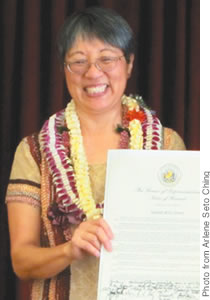Arlene Seto Ching

By .(JavaScript must be enabled to view this email address) | Share
 Del.icio.us
Del.icio.us
Let’s face it, we live in an age where information is just a keyword search away. And despite, or maybe because of, this easy access to facts that are constantly being updated, it seems we’re more out of touch with our past than ever before.
But thanks to the efforts of Waipahu children’s librarian Arlene Seto Ching, the history and stories of the West Oahu city are safe for future generations with the completion of her three-year Aiea Oral History Project.
“I’m honored to have the trust of the community to record their personal recollections and share it with others,” she says of the process, which involved conducting more than 30 interviews to compile firsthand accounts of the city.
“I thoroughly enjoyed meeting people and, afterwards, transcribing the interview. I bought an office transcribing machine to type the audio interview, but I still continued to do it the old-fashioned way!”
Besides some unused software, she also had help from UH Center for Oral History’s Warren Nishimoto and Micah Kodama-Nishimoto; Aiea Community Association president Claire Tamamoto, and community members Kehaulani Lum, Jean Fujinaga, Jeanne Omaye, Jordon Higa, Warren Munro, M. Kalehua Mueller and the ‘Aiealani Seniors.
Her work bringing this project to print also came with a price. Ching, the 2001 Public Librarian of the Year, had to resign from her position on the Read Aloud America board so that she could devote more time to collecting stories. She also had to put on hold leading tours of area landmarks, including Sumida Watercress Farms, the former taro lands and the volcano-inspired Aiea Library - if just for a while.
Her dedication was rewarded last week when the state House of Representatives presented the Pearl City resident with a certificate for her “enormous love, passion and energy ... that have enriched the lives and have built a lasting legacy for the people of Aiea and Hawaii.”
“I feel it (the recognition) reflects the effort of many who believe in the same dream I do,” Ching says, “that the personal recollections of Aiea residents should be preserved and that we must do it now.
“Okage Sama De is still very much a sensibility that many feel: ‘I am who I am because of those who came before me,’” she adds. “I would urge families to not put off ‘talking story’ with their elders and do their own family history. History isn’t just in books, but is in your own community.”
E-mail this story | Print this page | Comments (0) | Archive | RSS Comments (0) |
Most Recent Comment(s):













